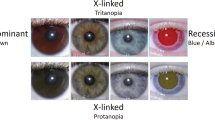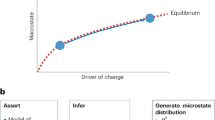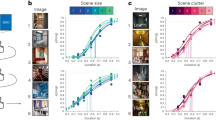Abstract
Intensive studies of visual illusion have rarely shown examples of polymorphic responses1–3. We show here that, using figures consisting of stripes shaded from dark to light, arranged in repeating sectors, an illusion of movement can be induced in about 75% of observers when viewed peripherally. The responses of the viewers fall into four categories. This polymorphic response suggests a genetic origin.
This is a preview of subscription content, access via your institution
Access options
Subscribe to this journal
Receive 51 print issues and online access
$199.00 per year
only $3.90 per issue
Buy this article
- Purchase on Springer Link
- Instant access to full article PDF
Prices may be subject to local taxes which are calculated during checkout
Similar content being viewed by others
References
Gregory, R. L. Eye and Brain; the Psychology of Seeing (World University Library, London, 1966).
Robinson, J. O. The Psychology of Visual Illusions (Hutchinson, London, 1972).
Coren, S. & Girgus, J. S. Seeing is Deceiving (Wiley, New York, 1978).
Author information
Authors and Affiliations
Rights and permissions
About this article
Cite this article
Fraser, A., Wilcox, K. Perception of illusory movement. Nature 281, 565–566 (1979). https://doi.org/10.1038/281565a0
Received:
Accepted:
Published:
Issue Date:
DOI: https://doi.org/10.1038/281565a0
This article is cited by
-
Integration of motion information in illusory motion perceived in stationary patterns
Scientific Reports (2023)
-
Spatiotemporal Kernel of a Three-Component Differential Equation Model with Self-control Mechanism in Vision
Journal of Mathematical Imaging and Vision (2023)
-
Motion illusion-like patterns extracted from photo and art images using predictive deep neural networks
Scientific Reports (2022)
-
Action Video Game Players Do Not Differ in the Perception of Contrast-Based Motion Illusions but Experience More Vection and Less Discomfort in a Virtual Environment Compared to Non-Action Video Game Players
Journal of Cognitive Enhancement (2022)
-
Explaining temporal qualia
European Journal for Philosophy of Science (2020)
Comments
By submitting a comment you agree to abide by our Terms and Community Guidelines. If you find something abusive or that does not comply with our terms or guidelines please flag it as inappropriate.



